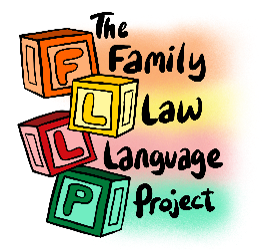Our Mission
The words we use are important. Whether we are writing a postcard to a loved one, a formal letter or a message to our partner about dinner, the words we use have consequences. Sometimes those consequences may not be significant. Sometimes they can be life changing. When dealing with family law matters, the stakes are always high and the consequences of using language that it outdated, inappropriate or confrontational can be significant. They are consequences that can be measured in damage and distress to children and families, in the burden on public resources which comes from protracted and unnecessary court proceedings and the financial and emotional cost of family litigation.
As legal professionals, we can ensure we use the correct terms and commit to using non-confrontational language in our communications. We can also explain technical terms and correct our clients when they get things wrong. We are, however, only a small part of the family justice system. It is system that ultimately needs to serve children and families, but which also involves local authorities, social workers, the judiciary, schools, psychologists, financial experts and numerous other professionals and service providers.
In 2020, a report from the Family Solutions Group report entitled “What about me?” identified a family justice system in crisis. It described an adversarial system that was overburdened and that pitched parents and families against each other. The report recognised the power that language plays in family law situations and identified specific problems including:
The use of incorrect terms by legal professionals, such as ‘residence’ and ‘contact’ instead of ‘child arrangements’;
A general misunderstanding of terms by the public, such as thinking that ‘co-parenting’ meant a 50/50 split in the time a child spends between parents; and
Adversarial layouts and language on court documents such as using Mother ‘versus’ Father.
The report made several recommendations about how to achieve change at a fundamental level including improving public education about family law and making the language of family law more accessible and less confrontational.
Perhaps one of the worst examples of the misuse of language in family law is the word ‘custody’. It is a term which is often used by parents and the media to talk about children when a marriage or relationship breaks down. When people talk about having custody of their children what they tend to mean is that they want to have control over the children and the relationship that the other parent has with them. It is word that is focussed entirely on the entitlement of the parent and immediately creates a conflict between the parent with custody and the parent without. The term ‘custody’ was considered so damaging that it was removed from the law of England & Wales as long ago as 1991. Yet thirty years later it is still common to find this term used by parents, professionals or the media.
Custody was initially replaced with the terms ‘residence’ and ‘contact’, to describe which parent the child would live with and the time that they would spent with the non-resident parent respectively. As mentioned above, these terms have already been replaced with Section 8 of the Children Act 1989 now referring to ‘child arrangements’. This puts the focus very firmly on the rights of the child rather than the parents and also demonstrates the evolving nature of legal language. If it is important enough to change the wording of law, then it is important that we use the correct terms and discourage use of the old terms. If we do not do this then the damage that was identified in the old terms will continue.
Another problematic term is ‘common law marriage’. You will hear people talk about being having rights as a common law husband or wife after living with their partner for a number of years. In 2018, the BBC wrote an article about the film Bohemian Rapsody which mentioned his “common law wife, Mary Austin.” There is no such concept in this jurisdiction but the misuse of these terms, particularly in mainstream media, perpetuates this myth. It could also lead to dire financial consequences for someone if a relationship ends.
The Family Law Language Project is a platform which launched in October 2021. Its mission is to help make the family justice system more understandable, more accessible and less adversarial by improving the language used both within that system and in the wider world. In order to achieve this the project has set up a website which provides accessible information about the language of family law using a variety of different media such as articles, audio clips, videos and images such as artwork and comics. The project will also use social media to identify language that is either incorrect or damaging and promote use of language that is correct and helpful. There will also be a forum for people to ask questions, share their experiences or make suggestions for how the language of family law can be improved.
At the moment, the Project is focused only on the English language but there are plans to translate the site into other languages to help deliver its objectives to a wider community and help address some of the problems that come from delivering a family justice system to a multi-cultural and international society.
If the family justice system is to have any hope of providing effective services to those who need them and of changing the adversarial nature of family law then it needs to speak in a language cooperation and welfare rather than conflict and entitlement. It is hoped that The Family Law Language Project can help achieve these goals.
If you would like to get involved then you can visit the The Family Law Language Project website or follow us on LinkedIn, Twitter or Instagram.
Emma Nash
